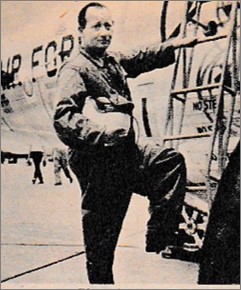Who Was Lloyd Mallan?

Mallon from his book Russia and the Big Red Lie, 1959.
Nobody remembers Lloyd Mallan. I came across his name while writing a book on poet- playwright Federico García Lorca’s iconic afterlife. Mallan’s piece on the poet’s assassination, published in 1939, was instrumental in spreading to the U.S. and Canada a highly embellished narrative of poetic martyrdom that helped shape the public image of Lorca. A Lincoln vet, Mallan also began a short-lived career as a translator, soon after having returned from war-torn Spain in 1938. The marriage of politics and literature was a rocky one for Mallan. His translating abilities took a hit from other translators and his ideological trajectory, following a well-trod path of disillusionment, went from communist to anti-communist. In 1945, he was also having financial difficulties. By the 1950s, he had stopped translating and turned to freelance writing, becoming a popularizer of science, especially space technology.
Born in Pittsburgh, Mallan (1914-1973) was from a Jewish family, the son of a Polish immigrant father and an American mother. He joined the Communist Party in 1932. In the hand- written Cadre files of the Russian State Archive of Socio-Political History (RGASPI), he is listed as American, single, and an artist. He arrived in Spain on 19 September 1937, returning home on the SS Manhattan, on 15 April 1938. But these are the bare outlines of a life. We learn more in some remarkable testimony he gave as a science writer in 1959 for hearings before the Committee on Science and Astronautics and Special Subcommittee on Lunik Probe, in the U.S. House of Representatives. Reflecting the McCarthy era, part of the questioning centered on Mallan’s time in Spain. Like other American volunteers in 1937, he said he was going to France to avoid breaking U.S. law, which restricted travel to Spain during this period. “Did you feel, Mr. Mallan,” one congressman asked, “that if you had stated that you wanted to go to Spain for the purpose of fighting with the Loyalists against the Fascists, that you would never have been given a passport?” Mallan replied, “I didn’t want to go to fight. I wanted to go as a radio technician.” He also denied ever having been a Communist or having knowledge of the Abraham Lincoln Brigade.
Mallan regretted having gone. “I thought a war that was being fought there at the time,” he said, “was a war against fascism. I didn’t really feel like being shot at, but I had been a radio operator in the Naval Reserve, and I knew quite a bit about radio.” Instead, he became a machine gunner in the Canadian MacKenzie-Papineau Battalion and eventually transferred to Radio Communications. In the end, he decided to bail, stowing away in a British freighter, where he was discovered in the boiler room. The seamen “turned me over to the assault guards who—with no charges against me by the way—had me listed for expulsion from the country. Meanwhile, I got 3 months in [Cárcel Modelo], the model jail of Barcelona.” Why did his translation career dry up? For that, the private correspondence of his co- translators for the bilingual project, An Anthology of Contemporary Latin-American Poetry (1942), edited by Dudley Fitts, provides an unduly harsh opinion of Mallan’s translating abilities amid conflicting theories of translation and fractious relations with Fitts. The number of Lorca projects that failed to launch include a biography, a translation of Romancero gitano, an anthology of his poetry, and the English version of Alfredo de la Guardia’s García Lorca, persona y creación. From Lincoln vet to bête noire of his fellow translators, in civil war and cold war, Mallan misfired on several fronts, embroiling himself in one fracas after another, an ironic commentary on a fellow who loved Lorca, wanted to build bridges of culture, and ended up burning his own. His enthusiasm for Lorca’s poetry and role in promoting his legend remain.
Noël Valis is Professor of Spanish at Yale University. Her most recent book is Lorca After Life (2022). This piece has been adapted by permission from a fuller account of Mallan, “Lloyd Mallan: Lincoln Brigade Volunteer and Early Lorca Translator,” Anales de la Literatura Española Contemporánea 47.1 (2022): 79-113.












